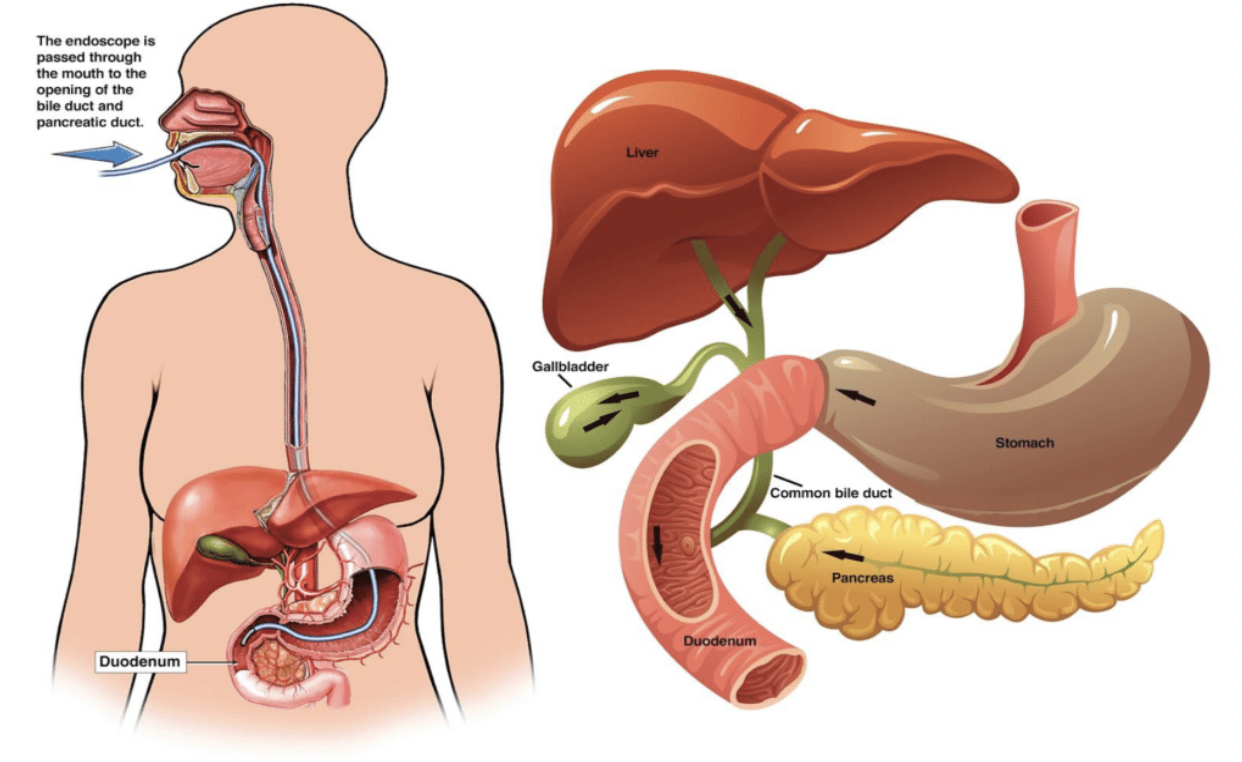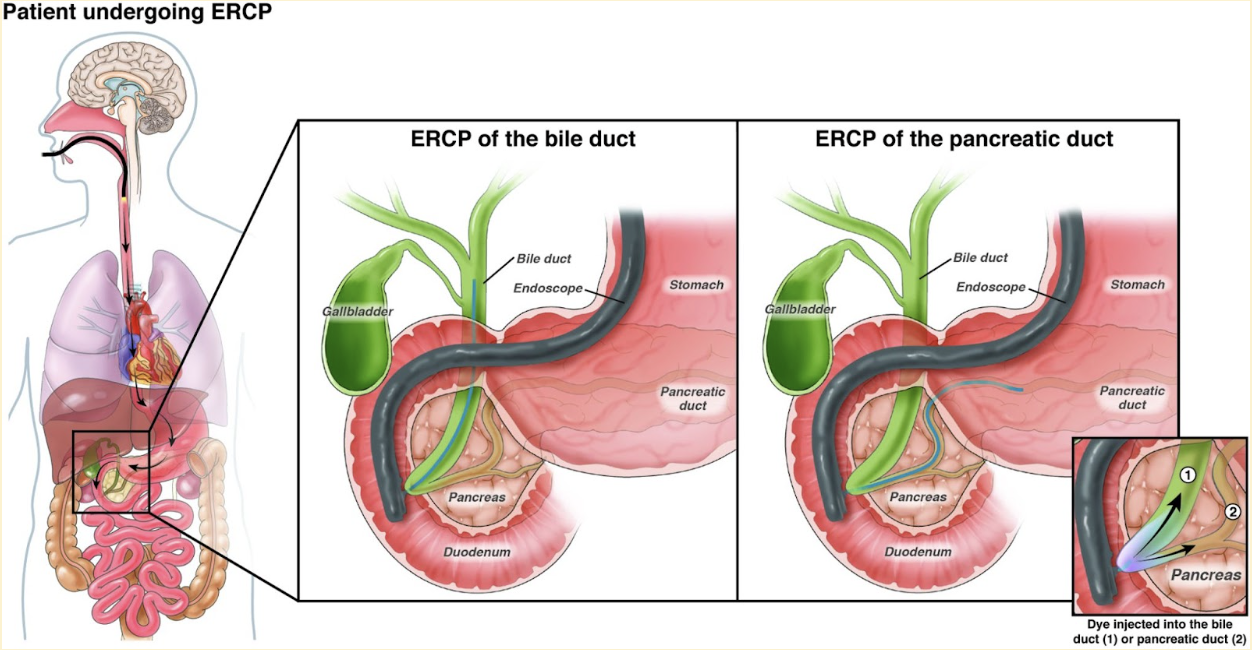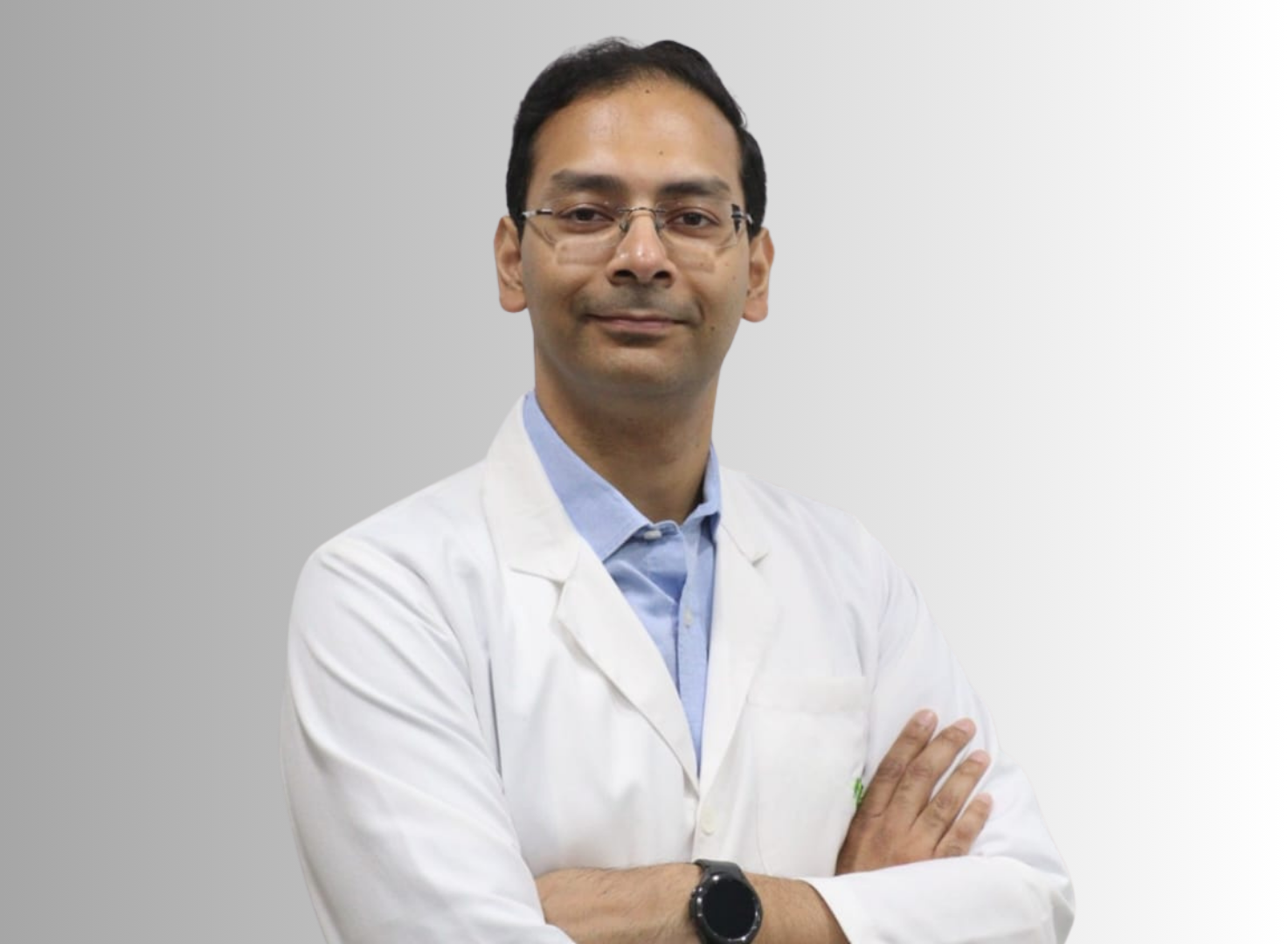Overview
ERCP is an outpatient procedure that allows doctors to visualize the small tubes inside the body, including the pancreatic and bile ducts, to diagnose and treat digestive conditions. These tubes carry digestive juices from the liver and pancreas to the intestines. Any abnormality in these tubes is diagnosed through this procedure, after which the doctor recommends the best treatment option.
What is ERCP?

Endoscopic Retrograde Cholangio-Pancreatography, commonly known as ERCP, is a non-surgical procedure that uses an endoscope and spot film to diagnose and treat disorders related to the bile ducts, the pancreatic duct, and the gallbladder. Under this procedure, a thin, bendable tube called an endoscope is inserted through the mouth, throat, stomach, or small intestine, where the ducts are injected with dye for imaging. This procedure allows the doctor to see how well the ducts are working.
Compared to usual surgery for these organs, ERCP is a faster and precise method. If you have been experiencing fewer symptoms of any pancreatic condition, the doctor will suggest this procedure and give instructions for preparation.
Why is ERCP done?
Your doctor may suggest that you opt for ERCP in case of the following conditions:
- If you have been experiencing unexplained upper abdominal pain or biliary colic.
- If there are signs of stalled bile flow or bile leakage, such as jaundice.
- In case of inflammation and possible infection in your ducts.
- In case of narrowing caused by scar tissue.
- If there are gallstones in your common bile ducts.
- If you have gallstone pancreatitis.
- If there are tumors or signs of cancer in your bile ducts.
- If there is a possible bile duct leak or other injuries.
When to See a Doctor?
It is advised to see a doctor for ERCP test in case of the following conditions:
- Jaundice, characterized by yellowing of the skin and eyes, indicates potential bile duct blockages or liver issues.
- Severe or recurrent abdominal pain may suggest gallstones or bile duct blockages.
- Sudden weight loss without a clear reason is linked with pancreatic tumors of the bile ducts.
- Fever or chills may be a sign of infection in the bile ducts or liver.
- Persistent nausea and vomiting.
- Changes in urine or the color of stool may indicate bile flow problems.
- Inflammation of the pancreas or pancreatitis.
Procedure

Before
Before the procedure, the doctor will list down some instructions to follow. It includes not smoking, eating, chewing gum, or drinking anything except water for 8 hours before the test. If you have any medical condition, discuss it with them in advance. They may ask you to discontinue some medications before the procedure. They will also tell you to arrange a ride home after the test, as the effects of anesthesia will take 24 hours to subside.
During
The healthcare professional will give you anesthesia through an IV. The sedation will make you feel comfortable and avoid pain. Here’s how the procedure is performed.
- The healthcare professional will insert the endoscope through the mouth and guide it down the esophagus and stomach to the top of the small intestine.
- Using the video camera on the instrument, they will locate the opening of the bile and pancreatic ducts and inject contrast dye into the ducts to check the images of the ducts.
- If any swelling, leak, or obstruction is found in your ducts, they will fix it through an endoscope. In case of a tumor, they will take a small tissue sample for biopsy. In case of gallstones, they will break up and remove them through tiny instruments.
After
You will remain in the hospital for 2-3 hours after the procedure, until the effects of anesthesia begin to subside. It is normal to feel groggy or spacey for the rest of the day. You may as well feel mild discomfort for 1-2 days after the procedure with symptoms like sore throat, difficulty swallowing, bloated stomach, gas pain, and nausea. Get in touch with the healthcare professional if these side effects persist for a long time.
Why Choose Us?
Dr. Anando Sengupta has been offering comprehensive services with his expert medical team. Here are the reasons to choose him for ERCP in Ashok Vihar.
- Dr. Sengupta is a qualified gastroenterologist in Ashok Vihar with years of experience, specializing in ERCP.
- His clinic is equipped with modern and advanced endoscopy units that work in tandem with current technology.
- The doctor ensures to offer each patient proper care, starting from consultation to aftercare and follow-ups.
- Dr. Sengupta believes in a patient-centric approach. Throughout the procedure, the doctor ensures that the patients feel more comfortable.
- With a record of a high level of success for multiple intricate conditions, Dr. Sengupta has proven his excellence as the best go to doctor for ERCP in Ashok Vihar. The doctor values the importance of the treatment and management of bile and pancreatic disorders with compassion and empathy.
Throughout the procedure, our healthcare team takes extra care to ensure that the endoscopy is performed smoothly and there is no discomfort or pain. Once the procedure is complete, our care team monitors your condition from time to time. We are a reliable service with a high level of professionalism that provides quality care to each individual.
Frequently Asked Questions
ERCP stands for Endoscopic Retrograde Cholangio-Pancreatography. It is a procedure that looks inside the bile and pancreatic ducts and diagnoses and treats abnormalities.
ERCP is done under mild anesthesia administered through an IV. Once injected, the patient doesn’t feel any pain or discomfort.
Like all diagnostic procedures, ERCP may lead to a little pain or discomfort. However, with sedation, your body and mind feel relaxed until the procedure finishes.
In case the healthcare professional finds gallstones in the bile and pancreatic ducts during ERCP, they break and remove them using special instruments.
ERCP is an outpatient procedure, and you can return home on the same day. It will take 1-2 days to fully recover after this test.




